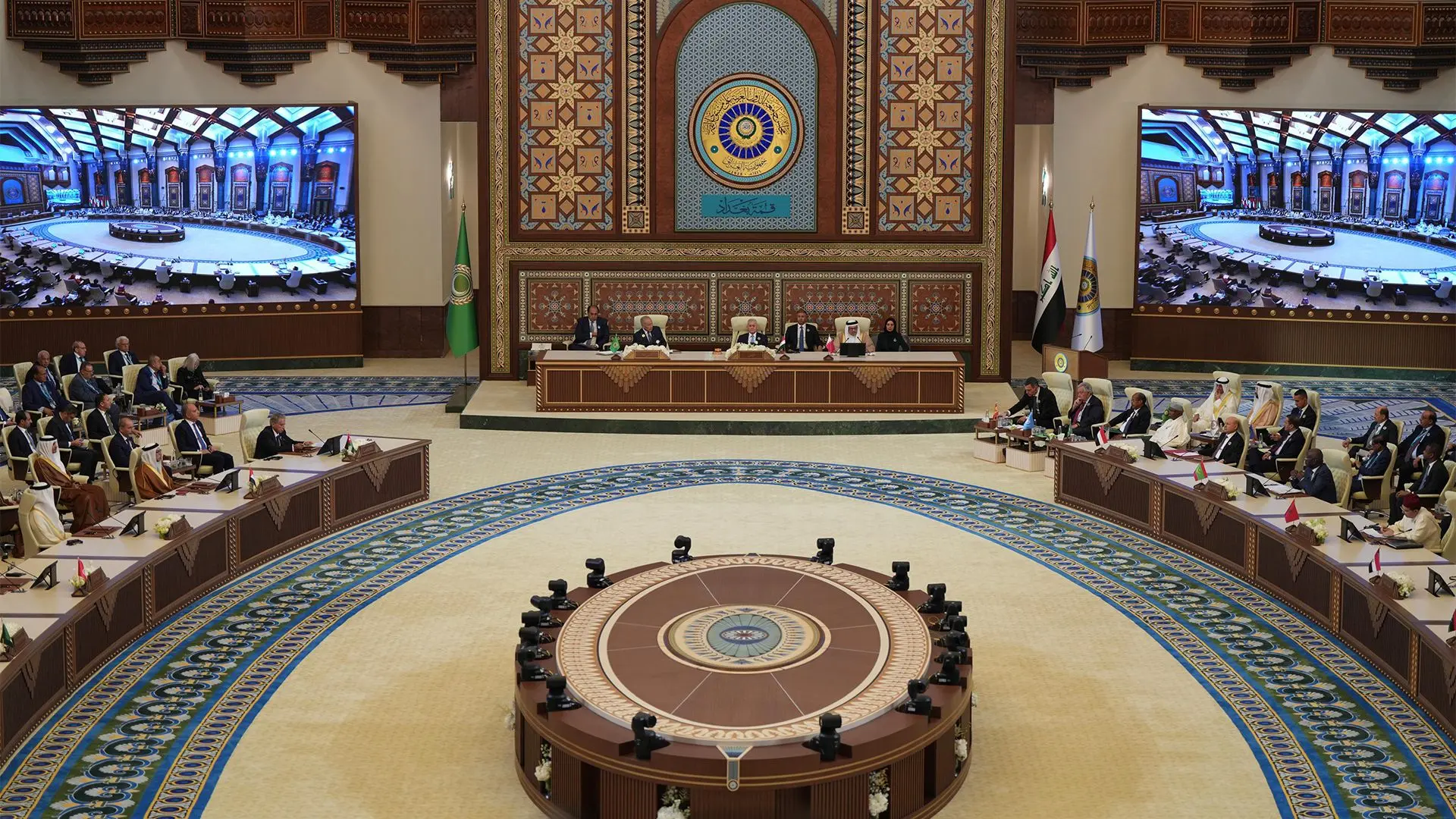Baghdad has transformed into the epicenter of Arab diplomacy as it hosts the 34th Arab League Summit and the 5th Development Summit today under the slogan “The Capital of Civilization Welcomes Its Brothers.” With most Arab leaders in attendance, the summit addresses critical regional issues including the Gaza conflict, sanctions on Syria, and security challenges across the Middle East, marking Baghdad’s fourth time hosting this prestigious 79-year-old gathering.
Historic Summit Returns to Baghdad
The Arab League Summit, a vital diplomatic forum with a 79-year history, has returned to Baghdad for the fourth time since its inception in 1946. Previous Baghdad summits were held in 1978, 1990, and 2012, underscoring Iraq’s enduring significance in Arab politics despite decades of turbulence.
Iraqi President Dr. Latif Rashid emphasized the summit’s importance, saying it “represents Iraq’s pivotal role and polar efforts to strengthen joint action in confronting challenges facing the region.” He highlighted how the gathering addresses “fate-determining issues” and adopts resolutions aimed at achieving peace and stability for the region’s peoples.
Prime Minister Mohammed Shia al-Sudani echoed these sentiments, describing the summit as “an affirmation of Iraq’s prominent role in advancing the region and initiating steps toward formulating a unified Arab position on various issues.”
The summit, operating under the theme “Dialogue, Coordination, and Development,” brings together Arab heads of state, senior leaders, and major international organizations to discuss pressing political, security, and economic challenges facing the region.
Gaza Crisis Dominates Discussions
The ongoing situation in Gaza emerged as the summit’s most urgent concern, with leaders unanimously condemning Israel’s military operations.
Iraqi President Latif Rashid declared that “the Palestinian people face an organized cleansing process aimed at eliminating the Palestinian presence on their own land.” He firmly rejected policies that violate the sovereignty and security of Arab nations.
Prime Minister al-Sudani condemned “the continued aggression against Gaza” and denounced all forms of forced displacement of Palestinians. He similarly condemned violations of Lebanese sovereignty while expressing Iraq’s support for Yemen and its unity.
Ahmed Aboul Gheit, Secretary-General of the Arab League, described Israeli efforts to impose hegemony over Palestinian land and the “genocide” of its people as “a disgrace to the entire world.” He praised Egyptian and Qatari efforts toward achieving a ceasefire in Gaza.
Syria’s Return to Arab Fold
Syria’s reintegration into the Arab community featured prominently in discussions, with many leaders welcoming the lifting of sanctions against Damascus.
Al-Sudani welcomed the removal of sanctions on Syria, while expressing Iraq’s rejection of “any attack on Syrian territory” and support for “a transition process that preserves the rights of all Syrians.”
Aboul Gheit noted that lifting sanctions on Syria would “help its people see a better future,” while Syria’s Foreign Minister Asaad Sherbani, representing Ahmed Shara at the summit, affirmed that “the Syrian people are committed to their Arab identity, and the Arab world is their refuge.”
Sherbani described the lifting of sanctions by the Trump administration as “an important step toward revival and reconstruction” and thanked Qatar for its “continuous support and firm stance toward the Syrian people,” along with the UAE and other Arab nations that “stood with the Syrian people.”
Regional Cooperation and Challenges
The summit addressed broader regional issues beyond the immediate crises in Gaza and Syria.
Bahrain, which handed over the presidency of the 34th Arab League Summit to Iraq, expressed support for “the plan to rebuild Gaza, stop the war, and send aid.”
Mohammed Ali Yousif, Chairperson of the African Union Commission, described the Baghdad Summit as “an opportunity to activate partnerships with Arab countries” while condemning the “mass extermination” of Palestinians in Gaza.
The Secretary-General of the Organization of Islamic Cooperation, Hussein Ibrahim Taha, expressed hope that “all efforts will be activated to ensure the right of the Palestinian people to establish their state.”
Aboul Gheit noted that the concept of Arab national security remains “far from being realized” due to intervention and ambitions of outside powers. He highlighted continued divisions in Libya that threaten the country’s unity and observed that Lebanon is “going through a historic test” in limiting weapons possession solely to the state.
The summit concluded with a final communiqué that firmly rejected the displacement of Palestinians from Gaza, called for the resumption of humanitarian aid deliveries, and urged the international community to increase pressure to stop bloodshed in Gaza. The statement also strongly condemned Israeli attacks on Syria and expressed hope for a political solution to the conflicts in Sudan.
In a notable development, Qatar’s Emir Tamim bin Hamad Al Thani departed Baghdad without delivering his scheduled address at the summit. The reason for his early departure remains unclear, though reports indicate he held bilateral talks with Iraqi Prime Minister al-Sudani before leaving.


